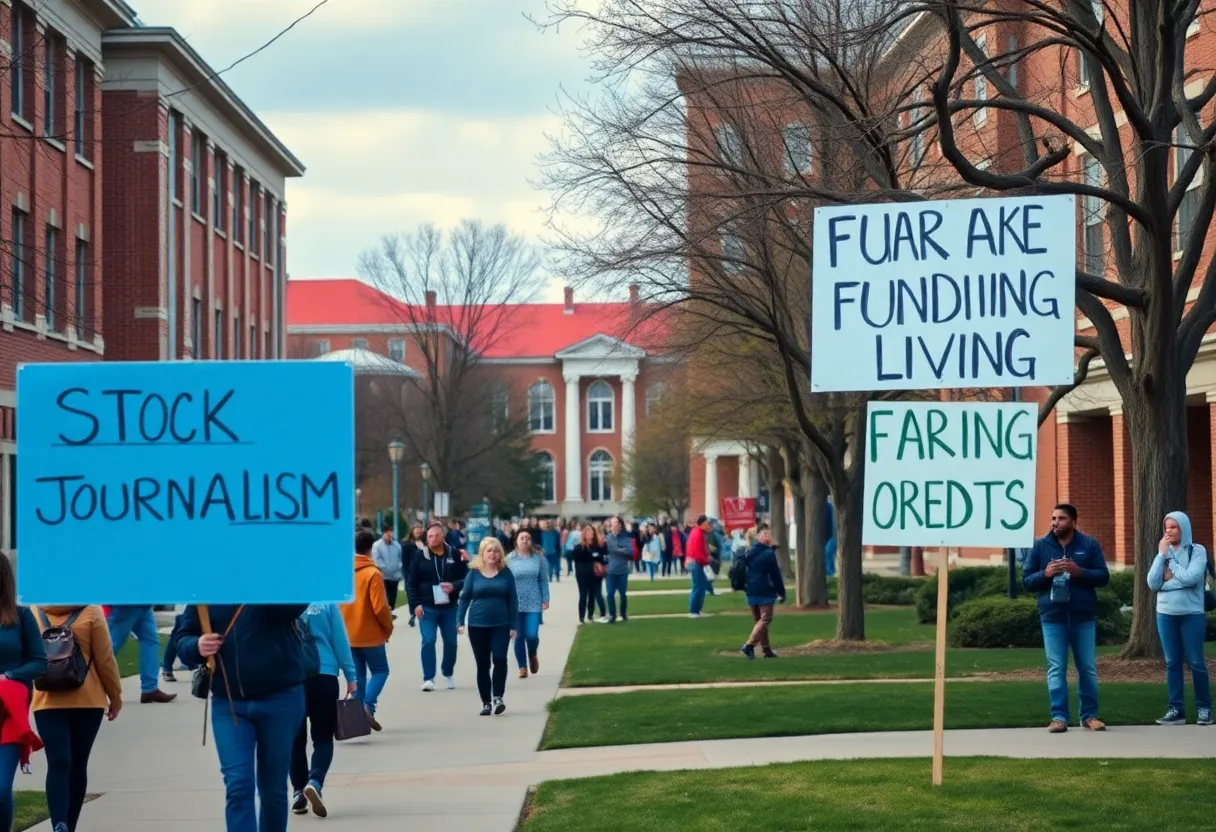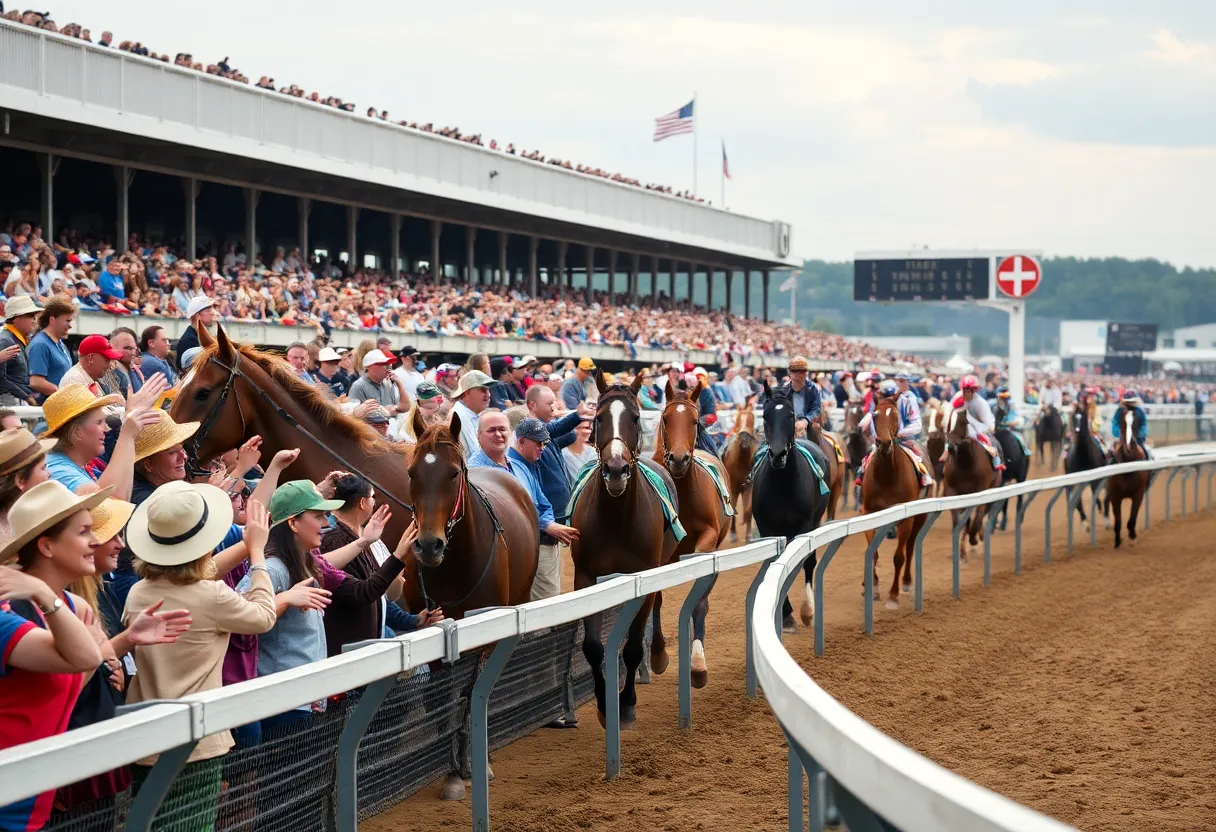Louisville, KY, October 27, 2025
At the University of Louisville, budget cuts are jeopardizing the future of its student newspaper, The Louisville Cardinal, while substantial funds are allocated to athletics. University administrators have cited financial constraints, yet recently approved $10 million for sporting facility upgrades. This decision has sparked protests from students advocating for a fair resource distribution, emphasizing the importance of journalism in maintaining accountability within the university. The ongoing controversy raises questions about the balance between supporting athletic programs and fostering educational initiatives.
Louisville, KY – Budget cuts at the University of Louisville are threatening the future of the student newspaper, The Louisville Cardinal, while the institution simultaneously allocates millions of dollars to its athletics programs. University administrators have cited ongoing financial difficulties as the primary reason for the reductions, yet they recently greenlit $10 million for upgrades to athletic facilities focused on football and basketball.
These cuts come amid broader fiscal challenges, including declining enrollment and increased operational costs, which officials say necessitate difficult choices. The decision to prioritize athletics has drawn sharp criticism from student journalists, who argue that the newspaper plays a crucial role in holding the university accountable and informing the campus community. Without adequate funding, The Louisville Cardinal risks reduced staff, limited publication frequency, and diminished coverage of campus issues.
In response, students have organized protests outside the administration building, calling for a more equitable distribution of resources. Demonstrators emphasize that while athletics generate revenue through ticket sales and sponsorships, supporting educational initiatives like student media is essential for a balanced academic environment. The recent success of the university’s football team, including a notable win that boosted attendance and merchandise sales, has been highlighted by critics as evidence that sports are overshadowing other priorities.
University’s Rationale and Defenses
University President Kim Schatzel has defended the allocation of funds to athletics, pointing to the potential long-term economic advantages. Enhanced facilities, she notes, attract top talent, increase game attendance, and foster alumni engagement, all of which contribute to the institution’s financial stability. The upgrades are intended to modernize stadiums and training areas, making them competitive within the Atlantic Coast Conference (ACC) and beyond.
Despite the controversy, the administration maintains that these investments are strategic. Athletics programs at University of Louisville have historically driven significant revenue, with football and basketball alone generating millions annually through broadcasting deals and donor contributions. Officials argue that the revenue from successful sports teams indirectly supports the broader university budget, even if direct allocations to areas like student media are reduced.
Student and Faculty Reactions
The backlash has been swift and vocal among students and faculty. The editor-in-chief of The Louisville Cardinal expressed concern that the cuts prioritize revenue-generating activities over the foundational elements of education, such as independent journalism. Student groups have rallied, holding signs and chanting for transparency in budget decisions. Protests have remained peaceful but persistent, occurring daily since the announcement.
The faculty senate has also weighed in, debating the implications during recent meetings. Some members propose exploring alternative funding sources for the newspaper, such as grants from journalism organizations or increased alumni donations specifically earmarked for student media. Others advocate for a comprehensive budget review to reassess priorities across all departments. The senate’s discussions underscore the tension between short-term financial pressures and the long-term value of campus journalism.
Broader Context of College Athletics Funding
This situation at University of Louisville reflects wider trends in college athletics, where sports programs often command a disproportionate share of institutional budgets. Across the nation, universities invest heavily in facilities and coaching to remain competitive, driven by the high stakes of conference realignments and lucrative media contracts. At the same time, academic resources, including student publications, frequently face scrutiny during budget shortfalls.
Alumni play a significant role in this dynamic, with many directing their donations toward high-profile athletic initiatives rather than academic or media programs. However, the current controversy has prompted calls for alumni to diversify their giving, potentially providing a lifeline for The Louisville Cardinal. As the university navigates these challenges, the community remains closely engaged, awaiting decisions that could shape the balance between sports and academics for years to come.
The ongoing debate highlights the need for universities to address funding disparities thoughtfully. While athletics can enhance school spirit and revenue, sustaining educational pillars like student journalism ensures a well-rounded campus experience. Resolution efforts continue, with stakeholders hoping for a compromise that preserves both the vibrancy of sports and the voice of student media.
Key Impacts on Campus
Athletics Benefits
- $10 million facility upgrades for football and basketball.
- Recent football wins boosting ticket sales and alumni donations.
- Long-term economic gains through increased competitiveness.
Student Media Challenges
- Threatened operations of The Louisville Cardinal due to budget cuts.
- Protests demanding balanced resource allocation.
- Faculty proposals for alternative funding sources.
FAQ
- What budget cuts are affecting The Louisville Cardinal?
- Budget cuts at the University of Louisville are threatening the future of the student newspaper, The Louisville Cardinal, even as the school allocates millions to athletics.
- How much money is the university spending on athletics?
- University officials cited financial strains, yet approved $10 million for facility upgrades to support football and basketball programs.
- Why are student journalists upset about these cuts?
- Student journalists express dismay, arguing that cuts undermine campus journalism vital for accountability.
- What has been the student response to the budget decisions?
- The decision has sparked protests among students, who rallied outside the administration building demanding balanced priorities.
- How does the university justify prioritizing athletics?
- Athletic success, like the recent football win, has boosted ticket sales, but critics question if sports overshadow academics. President Kim Schatzel defended the move, emphasizing long-term economic benefits from enhanced athletic facilities.
- What is the faculty doing about the situation?
- Faculty senate debates the issue, with some proposing alternative funding for the paper.
- What broader issues does this highlight?
- This controversy highlights tensions in college athletics, where sports often dominate budgets. Alumni donate heavily to sports initiatives, but now face calls to support student media.
Budget Allocation Comparison
The following table outlines key aspects of the budget decisions at the University of Louisville, contrasting athletics investments with impacts on student media.
| Category | Details | Impact |
|---|---|---|
| Athletics Funding | $10 million for facility upgrades to support football and basketball programs | Enhances competitiveness and revenue generation through ticket sales and alumni donations |
| Student Newspaper Cuts | Budget reductions threatening operations of The Louisville Cardinal | Undermines campus journalism vital for accountability, leading to dismay among student journalists |
| Student Response | Protests outside administration building demanding balanced priorities | Sparks community debate on resource allocation |
| Faculty Actions | Senate debates and proposals for alternative funding | Aims to preserve student media amid financial strains |
| University Defense | Emphasis on long-term economic benefits from enhanced athletic facilities | Justifies prioritization despite criticisms that sports overshadow academics |
Deeper Dive: News & Info About This Topic
HERE Resources
Airline Perks Decline Impacts Louisville Holiday Travel
University of Louisville Reveals Top Earners in Salary Database
University of Louisville Welcomes New President Dr. Gerry Bradley
University of Louisville Inaugurates New President Amid Protests
Louisville’s Private Schools Invest Millions in STEM and Campus Growth
Kentucky Energy Projects Face Funding Cuts Under Federal Budget Proposal
University of Louisville Welcomes Incoming President Dr. Bradley Amid Focus on Research and Student Success
Kentucky’s Higher Education Faces Enrollment and Degree Attainment Challenges
Potential Affordable Care Act Changes Threaten Kentucky Families’ Healthcare Access





